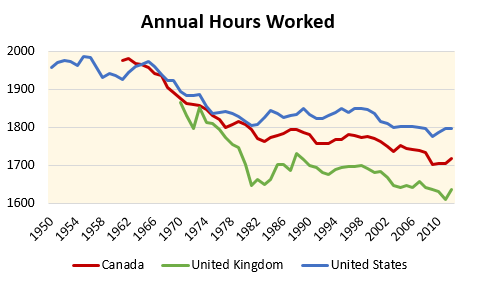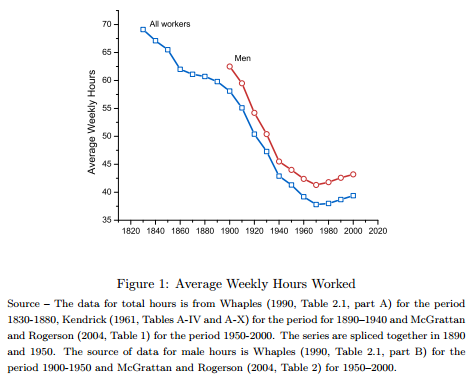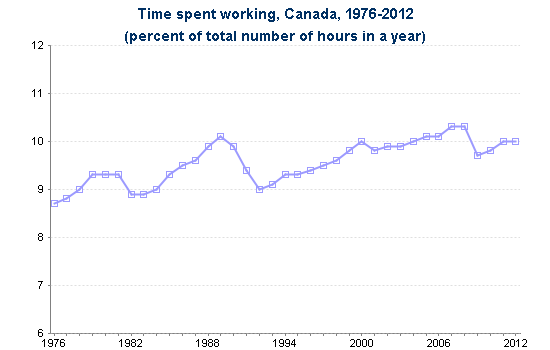The struggle for fewer working hours during the day, and by extension the week and the year, was long a cornerstone of organized workers. Both the struggle and the actual number of hours worked has stalled of late. Annual hours worked in Canada, the US and UK have all followed a similar pattern, flat-lining since the 1980s.

Looking at weekly hours in a longer perspective, the last several decades look even more anomalous. Keynes, who famously predicted that we would be working 15 hour weeks by the 2030s, is surely turning in his grave… Nevermind Marx, who spent hundreds of pages painstakingly documenting changes in working time and put active worker struggles at the centre of his analysis.

Finally, looking at Canada, the same past three decades that have seen working time reductions stall on the level of individual workers have also seen the total time we as a society spend working rise. As new parts of our lives are privatized and put on the market, more of our communal time appears as waged work time.

There are many interacting factors that have contributed to the slow-down if not reversal in working time. Changes in who works both in the North and the South (women entering the workforce in the North; the global redistribution of production to the South), changes to the technology of production, changes in the social wage that have reversed the growth of public services and changes in the power of workers expressed through unions are surely among them.
The misplaced hoopla about the “new economy”, more flexibility, or the “sharing economy” shows the limits of any analysis that does not take into account the history of political struggle. Sharing sounds nice but it is telling that one key area where there is too little sharing is in the field of work and jobs. Indeed, the sharing economy can often create more work and more precarious work.
Struggles for less work connect with the broader values of the labour movement and offer one more avenue for its renewal. In These Times yesterday published an interview with Dean Baker, Kathi Weeks and Peter Frase that tries to bring together demands for increasing employment during a recession (recovery from which is working only for the rich) while at the same making less work. Frase makes the link clearly:
But to economists, full employment is a technical term for the equilibrium between supply and demand for labor. You can get there in multiple ways—not just by creating as many jobs and as many working hours as possible. But I like the way Dean presents it, where it’s not the jobs themselves that are the value. Workers having bargaining power is a value. People having access to the resources they need to live a decent life is a value.
One reply on “May (we struggle to work less during the) Day”
[…] work not only “good” but even a “job” keep falling. It’s hard to fight for better (and less) work in light of decades of defeat for workers as an organized force, years of lingering […]